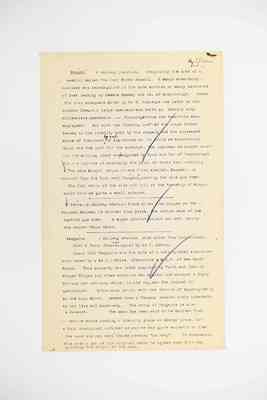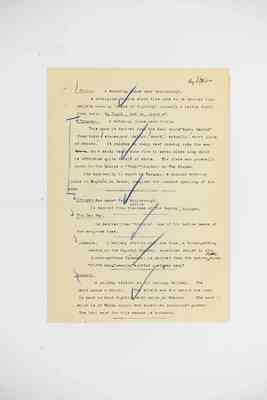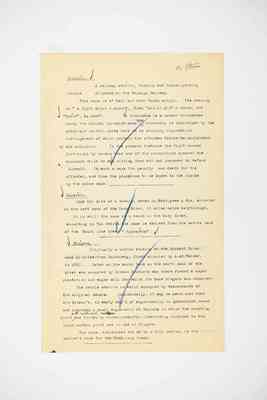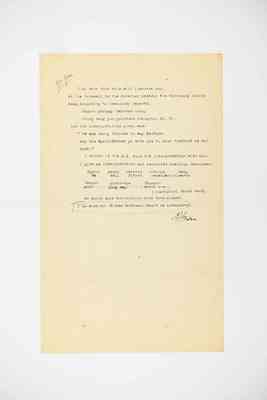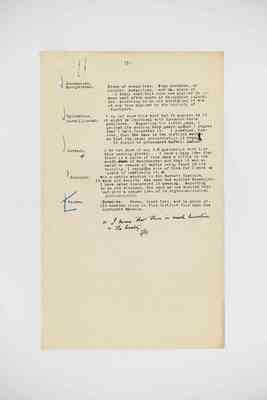Pages That Need Review
Correspondence Between Sydney May And F.J Watson Concerning Aboriginal Place Names (ITM489477)
93
[right margin] [by F J Watson]
[Mungar] A railway junction. Originally the site of a sawmill called the [Mary River Sawmill]. A small sawmilling business was hereacquired in the late sixties or early seventies of last century by [Messrs Ramsay and Co.] of [Maryborough]. Under the able managment ,first by [Mr H. Armitage] and later by his brother [Edward] ,a large business was built up whereby many millworkers ,mechanics , and timber-getters and teamsters were employeed. But with the "cutting out" of the large timber leases in the locality held by the company and the increased means of transport by rail of log timber to the mills at [Maryborough], which was the port for the district, the business at [Mungar] waned and the milling plant was/acquired by [Hyne and Son] of [Maryborough] for the purpose of enlarging the plant at their town sawmill,
The name Mungar or,as it was first spelled, Mungarr, is derived from the Kabi word Mungarr,meaning the blue gum tree.
The full story of the rise and fall of the towship of [Mungar] would read as quite a small romace.
[Yerra]. A railway station three miles from [Mungar] on the Gayndah Railway is derived from yirra, the native name of the spotted gum tree. A sugar plantation,now non est, nearby was called [Yerra Yerra].
[Yengarie]. A railway station, nine miles from [Maryborough].
Also a Dairy farm now occupied by [Mr J. Mahony].
About 1862 [Yengarie] was the site of a boiling-down establishment owned by a [Mr J.C.White], afterwards a [M.L.C.] of New South Wales. This property was later acquired by [Tooth and Cran] of [Widgee Widgee] and other stations who erected and managed a sugar factory and refinery which, in its day,was the largest in Queensland. After many years, with the decline of sugar-growing on the [Mary River], Messrs [Cran & Company] removed their interests to the [Isis] and [Bundaberg]. The story of [Yengarie] is also a romance. The name has been said to be derived from native words meaning a sleeping place or sleepy place, but a Kabi aboriginal informed me,and he was quite emphatic on that the name was yan Kárí (karee)meaning "go away". In discussing this with a son of the original owner he agreed that this was probably the origin of the name.
94
[rigth margin] By [F J Watson]
[Pialba]. A watering place near [Maryborough].
A aboriginal source shows this name to be derived from baiyiba meaning "place of fighting" actually a battle field. from baiyi, to fight , and ba, place of.
[Torquay]. A watering place near [Pialba].
This name is derived from the Kabi words"tukki dalbur" from tukki , stones ,and dalbur, short; actually, "short place of stones." It relates to rocky reef running into the sea on a on a sandy beach some five to seven miles long which is otherwise quite devoid of stone. The place was generally known to the blacks a "Tukki"(Tuckee) or The Stones.
Its similarity in sound to [Torquay], a popular watering place in England,no doubt, inspired the present spelling of the name.
[Urangan].Now named [Port Maryborough].
Is derived from the native name of the dugong, Yuangan.
[Tin Can Bay].
Is derived from "tinchin" one of the native names of the mangrove tree.
[Aramara]. A railway station and, one time, a timbergetting centre,on the Gayndah Railway, sometimes called by oldtimber-getters Yúramára, is derived from the native Kabi worss "yirra mara"meaning"spotted gumtrees many".
[Goomeri].
A railway station on the Nanango Railway. The word means a shield. The shield was the narrow one used in hand to hand fighting with nulla or dhaberi. The word which is of Wakka origin was sometimes pronounced gudmeri. The Kabi word for this weeapon is kunmarim.
95
[right margin] By [F J Watson]
[Kinbombi].
A railway station, farming and timber-getting centre. Situated on teh Nango Railway.
This name is of kabi and also Wakka origin. Its meaning is " a fight about a woman", from "kin, or gin", a woman, and "bumbe" , to beat". A kin-bumbe is a common occurrence among the blacks, in which case one adversary is challenged by the other and certain rules have to be strictly regarded,an infringement of which renders the offender liable to punishment by onlookers. In the present instance the fight became historical by reason that one of the contestants spreared his opponent while he was sitting down and not prepared to defend himself. In such a case the penalty was death for the offender, and thus the place/came to be known to the blacks by the above name.
[Dundáthu].
Once the site of a sawmill owned by [Pettigrew & Sim], situated on the left bank of the [Mary River], 10 miles below [Maryborough],
It is still the name of a reach in the [Mary River]. According to [Tom Petrie] the name is derived from the native name of the Kauri pine tree, " dundardum".
[Bingera].
Originally a cattle station on the [Burnett River] some 12 miles from [Bundaberg]; first occupied by [A.&R.Walker]. in 1857. Later on,the scrub land on the north bank of the river was occupied by [Gibson Brothers] who there formed a sugar plantation and sugar mill for which the name Bingera was retained.
The cattle station is still occupied by descendants of the original owners. Incidentally, it may be mentioned that the [Gibson's], in early day's of sugar-making in Queensland,owned and operated a small sugar-mill at [bulimba] in which the crushing plant with vertical rollers was driven by horse-power, an interesting contrast to the large modern plant now in use at [Bingera].
The name, translated for me by a Kabi native, is the native's name for the fish, bony bream.
96
[right margin] By [F JWatson]
[Theebine].
The name of a Railway junction on the North Coast Railway. The name is derived from dhilbvine (i as in wine), one of the natives' names for the lung-fish, ceratodus.
It is claimed by some to be of Kabi, ([Mary River]) origin, but a Kabi, ([Mary River]) native known to me, called the fish jalla,or dhallar. I believe that Dhilbvine is a Wakka ([Burnett River]) word.
97
[JW? Mi?]
I am sure that this will interest you.
At the farewell to the Governor General the Cherbourg blacks sand,according to newspaper reports,
Gnurri yarrum barrvon brung Khung bung gun gorrenda thangoon. Si. Si.
And the interpretation given was-
"We are sorry friends to say Goodye. May the SpiritFather go with you to your homeland is our wish."
I wonder if the G.G. took the interpretation with him. I give my interpretation and corrected spelling hereunder.
Ngairi Yaman barbvon byrunga kung We tell father remember ( on )water
bangun guran-dya dhungan much long way watch over. (Aboriginal short hand).
No doubt some inflections have been missed.
[in pencil box] I am sure [Mr Firman McKinnon] would be interested.
[FJ Watson]
98
(1) Queensland Place names and Their Meanings.
[Taringa].[crossed] From tarau-nga, meaning stoney. Said to be an aboriginal name for a quarry in the vicinity. From Tarau, loose stones.
[Purga]. [crossed] No information on this name.
[Tarampa].[crossed](1) From tarum ,meaning wild lime tree,and pa or ba,place of. Of aboriginal origin.
[Mooloolah]. Aboriginal term for place of black snakes; from mooloo,meaning black or dusky; also native name for the black snake.
[Eudlo].(2) Meaning eels. From yooloo,or, yoodloo,meaning eels.
[Woombye]. From wombai ,meaning the black myrtle tree.
This word also means tomahawk handle,probably owing to this pliable wood being used to make the cleft handles of stone axes.
[Nambour]. Is not the kurrajong tree. It is the native name for the ti-tree and its bark. One authority, a white man,has stated that the word is the native name of the read flowered ti-tree, but an aboriginal has informed me that it is the white flowered ti-tree and that the native name of the red-flowered ti-tree is dibbing.
[Maroochydore]. Meaning, place of black swans. From mooroo(3)-cochee-dya, abbreviated from Mooroo-kootchee-dya, meaning place of black swans, from mooroo, beak or bill (or nose-) and dya,country or place. The native name of the black swan ,in English, is the Red Bill. (of [Yaguabul?] origin)
[Beerwah]. The tallest of the [Glass House Mountains] group.
The meaning of the word is "up in the Sky". It is derived from the native words Birra, the sky,and Wa, an aboriginal abbreviation of the word wandum, meaning to climb or go upwards.
[Beerburrum]. (1) [Tom Petrie] has given the meaning of this name as "parrot". It is probably derived from "pir"(1) the green leek parrot. I am inclined to the opinion is that the whole word means Green leek parrot's back.
[Bunderim]. Butharum, The kabi native name of the honeysuckle tree,( Banksia latifolia).
99
(3)
[Moondarowa]. [Moonjerabah].
Place of mosquitoes. From mundhera, or munjera, mosquitoes, and ba, place of.
I think that this name now applies to some part ofthe south of [Stradbroke Island]; but, according to an old aboriginal it was at one time applied to the vicinity of [Southport].
[Kynnumboon]. [Murwilllumbah].
I do not know this word but it appears as if it might be identical with Kunumbun above mentioned. Regarding the latter name, I learned its meaning many years ago|but I regret that I have forgotten it. I remember, however, that the name is two distinct words. so that its usual pronunciation is wrong.
It should be pronounced Murwill Lumbah
[Carrara].
I do not know of any S.E Queensland word like this meaning gravel. I have a hazy idea that there is a place of this name a little to the south east of [Rockhampton] and that it was so named by reason of marble being found in its vicinity. I cannot|be sure of this for I have no means of confirming it. *
[Boobyjan].
Was a cattle station in the [Burnett] District. In some old records the name was spelled Boonbyjan. I have never discovered it meaning. According to an old stockman, the name as now spelled does not give a proper idea of it right--aboriginal pronunciation.
[Benowa].
Bunau-ba. Bunau, blood tree, and ba,place of. (In another place in this district this name has corrupted Benoble.
* I know that there is much limestone in the locality. [FJW]
100
Grosvenor Street, [Toowong]; S.W.1. 17th May, 1939.
Dear [Mr. May],
In responce to your telephoned request of this I am enclosing herewith two letters which I have received from [Mr. Inigo jones]. I may explain that as I had noted that [Mr Jones] and his father was in the vicinity of the [Glass House Mountains] during the deluge of 1893 (per a Courier of that period) I wrote to him asking if he could give me any information as to the condition of [Mt. Crockneck] prior to that year. His letter of 27th march is the reply thereto.
I again wrote to him and sent him the picture of the mountain that I despatched to you yesterday. His letter of 18th April is his reply thereto. I am sorry that it gives no information of any value whatsoever.
[Mr Jones] seems to have lived at [Crohamhurst] nearly all his lifetime,but,if he can give no more reliable information about the [G.H.Mountains] than is contained in this letter,I think that [Crockneck] may have lost its head or even one of the mountains could have disappeared without him being interested in the matter.
Yours faithfully [FJWatson]
101
Grosvenor Street, [Toowong], S.W.1. 8th May, 1939.
Dear [Mr. May],
I am herewith sending you some notes on what I know of the place names in your list. Of those which I have not mentioned I do not know the native meanings. But of a good number I have notes on persons and dates of first occupation but I think you have these in hand. I am sorry to say that I know nothing of the [Darling Downs] native tribes or their language. It is said, however, that the north-eastern [Darling Downs] natives spoke the Wakka language but there is some doubt as to that.
I believe that Chingerrie[circled] was one of the native names for [Drayton] but xx I do not know its meaning. The place name, [Toowoomba],I have dealt with in the notes I am sending to you.
I have never been able to find out the meaning of the name [Toolburra], the pioneer [P.Leslie]'s first station on the [Down's]. As it is the centenary of [Leslie]'s arrival on the [Downs] x it may just now be of interest. If you are so interested, an inquiry of Mr. [Edward Donald] of Campbell Street, [Toowoomba], may bring some result. Mr. [E.Donald] is a son of Mr. [Geo. Donald] who arrived in Queensland as a boy,riding a mule in [Leslie]'s train. (This is not recorded in history but it is fact). Mr. [E. Donald]. has spent a life-time in pastoral pursuits on the [Downs]. If you so wish, I can give the meanings of a number of native place names in the area around [Maryborough]. Lumbago etc.makes me very tired by eventide which is the only time I have for writing so I trust you will excuse my dealy in replying.
Yours faithfully,, [FJWatson]
[left margin corrections?] [Chinquerrie?]
[Toolbuna?]
102
[Numabulla]. SiadSaid to be a name of the [Mary River]. Other names given by various authorities are [Monoboola?], Morrobocoola, Yahboon and Cooron. I can trace no meaning to any of these words. I doubt if any of them apply to the river iteself;
They are more likely to be names of some places on the river.
As showning the absurdity of the application aboriginal words words,by whites, as names of places,the names Gudna and kooroomandan have been also given as names of the [Mary River]. The first is a word meaning dung and the latter is "kangaroo country".
Howah & Hinha --- Are evidently not native names,at least not as they are spelt and pronounced, for no S.E. Queensland native word or syllable commences with an aspirate.
[Toon]. Flat where where [James Davis] (Dha-ami pai, little kangaroo rat), runaway convict, was living when reclaimed from savagery. I think that this a miss-spelled word or an abbreviation of one for, as written it is the Kabi word for tail and also for the male organ of generation.
[Tiaro] (Letter i pronounced as i in wine-. Derived form the Kabi word "dauwa" meaning, as a verb "withered" and as a noun, "dead tree". This locality was at one time the territory of the Dauwaburra (Dead tree people), a division of the Kabi tribe. (see not on this place on an other sheet herwith).
[Noosa]. I have never heard definitely what is meant by this name. One definition, given by one who was very positive on the matter, was that a white man asked a native if he knew the meaning of the word and the native replied "Noo sir".
However, if a native word it is miss-spelled, for the sibilant S does not occur in S.E.Queensland native words.
I think the word is probably"nuthuru or as some of the blacks pronounced it"nguthuru " meaning,literally, a shadow but also a ghost i.e. the shadow of a man. The superstitious nature of the blacks caused them to name many mounts and headlands after some form of spirit.
[FJW]
